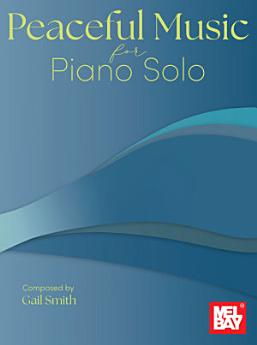Peaceful Music for Piano Solo
इस ई-बुक के बारे में जानकारी
Most of the pieces were composed in the quiet evening hours. So many things can inspire a melody…. poems, a scripture verse, a beautiful bouquet of roses, a kind word, or just a whim.
When you play the piece entitled “Ocean Waves”, the triplet notes in the piece are meant to represent the sound of waves. At measure nine, the melody of the hymn tune, “Holy, Holy, Holy” is heard. It’s as if the melody is carried by the wind in the middle of the ocean. John B. Dykes wrote the stately melody, “Nicaea” specifically for the lyric poem by Reginald Heber, “Holy, Holy, Holy, Lord God Almighty”. It was called the “The World’s Greatest Hymn” by the poet, Alfred Lord Tennyson. Perhaps that’s why the hymn came to my mind while composing the calm ending of “Ocean Waves”.
When you play the solos in the book, experience a feeling of peace as you contemplate the melody and interpret the song. Own the song and feel it means something personal to you. When I was writing “Bouquet of Roses”, I had recently received the most amazing bouquet of large and small pink roses. When you play the piece, notice that many note stems are higher, like the longer stems of some roses in a bouquet. Imagine the notes as flowers as I did when composing the piece.
It’s hard to describe how feelings and melodies evolve and then disappear in thin air. Composers will continue to compose new songs forever. It encourages me to know that with the twelve tones of the Western chromatic scale, the factorial table informs us there are 479,001,600 possible combinations of those notes. Just think of arranging them, giving rhythm, chords, harmony, etc. It boggles the mind to say the least.
So, for now, enjoy these twelve pieces and be at peace.
लेखक के बारे में
Gail Smith was born in Bridgeport, Connecticut, on January 26. Gail's father, Carl Erick Johnson, sang tenor in the church choir. Her mother, Ethel, played the piano and had Gail start piano lessons. Smith received her Bachelor of Fine Arts Degree from Florida Atlantic University. She has taught piano students from the age of 3 to 96! Her blind student, Ivan, was seen on national TV. Giving musical lecture recitals by portraying the composer's wife has been an effective way to reach audiences with the history of music. Gail has portrayed Marian MacDowell and Anna Magdalena Bach. She gives many workshops and concerts throughout the United States as well as in Germany, Sweden and Japan. Smith's life has revolved around her family, church and music. She has been active in many organizations including being national Music Chairman of the National League of American Pen Women and is a former president of the Broward County branch. Ms. Smith is also a member of The Freedoms Foundation of Valley Forge, National Music Teachers Association, and Federation of Music Clubs.
Ms. Smith's works include many piano solos, choral works, a piano trio, a composition for four pianos and numerous vocal solos. She has arranged hundreds of hymns, Indian melodies, and folk tunes from many countries. Her trademark is her piano palindromes, which can be played backwards as well as forwards and sound the same. She is the author of: Complete Church Pianist, Sunday Morning Pianist, Four Centuries of Women Composers, Celebrate the Piano Series, Hymns Made Easy, Piano Chords Made Easy, Complete Book of Modulations for the Pianist, Complete Book of Exercises for the Pianist, and Complete Improvisation, Fills & Chord Progressions Book. Gail also composed the world's first reversible piano solo, which sounds the same upside down and is titled "WOW MOM". She loves researching the history of music and wishes to pass on her enthusiasm for piano study to all ages of beginning students, especially seniors.








